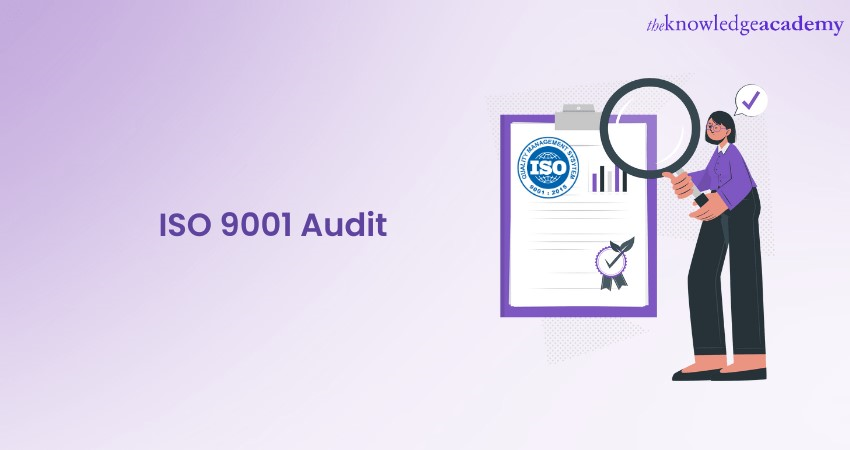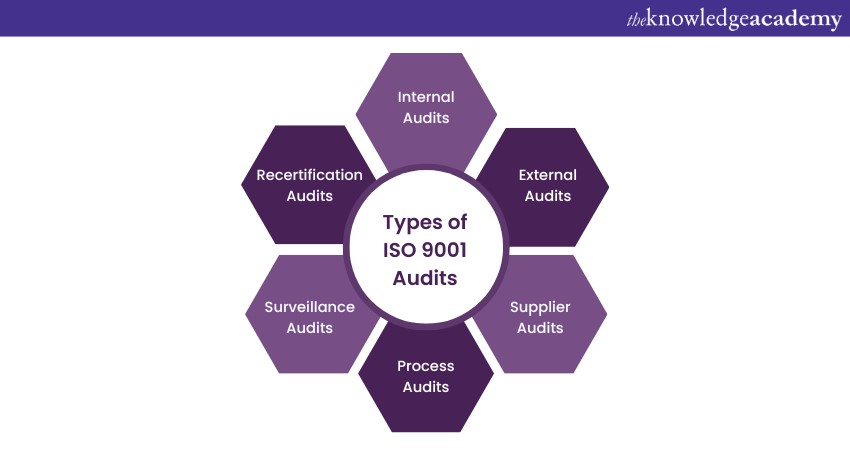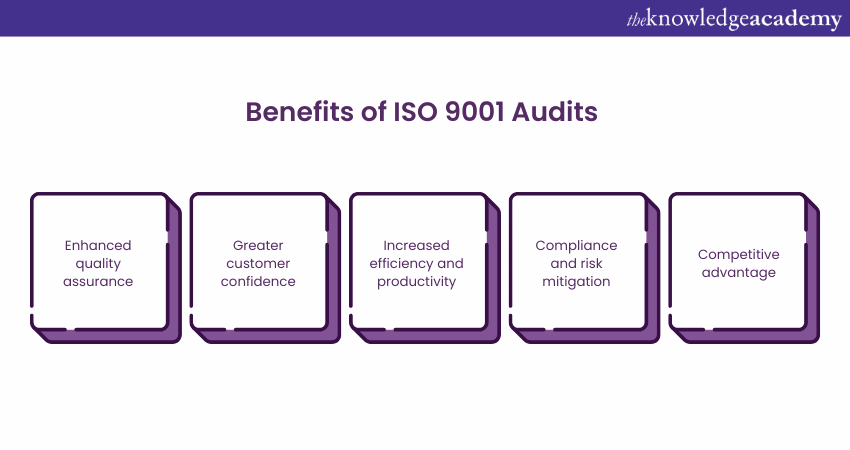We may not have the course you’re looking for. If you enquire or give us a call on +352 8002-6867 and speak to our training experts, we may still be able to help with your training requirements.
We ensure quality, budget-alignment, and timely delivery by our expert instructors.

Organisations can continuously improve their internal processes and exceed consumer expectations by implementing the methodical structure provided by ISO 9001. But obtaining and keeping ISO 9001 Certification requires dedication and compliance with guidelines. To maintain this certification, that is the time at when ISO 9001 Audit becomes important.
ISO 9001 Audits serve as a critical checkpoint, evaluating an organisation's compliance with ISO 9001 requirements and ability to deliver quality consistently giving the distinct methodologies of ISO 9001 vs Six Sigma in Quality Management System.
Explore more about this Audit and how it can help you achieve quality standards. In this blog, we will explore the process, various types of ISO 9001 Audits and their benefits. Let’s dive in to know more in details.
Table of contents
1) What is an ISO 9001 Audit?
2) Types of ISO 9001 Audits
3) What is the internal ISO 9001 Audit Process?
4) Benefits of ISO 9001 Audits
5) Conclusion
What is an ISO 9001 Audit
ISO 9001 is more than just a Quality Management Standard; it's a methodology that can transform organisations' operations. At its core, ISO 9001 ensures customer satisfaction by seamlessly delivering products or services that meet expectations underscoring the difference of ISO 9000 vs 9001. It provides a structured framework that encourages organisations to define their processes, identify areas for improvement, and establish a continuous enhancement culture.
ISO 9001 is designed to be adaptable, making it suitable for businesses of various sizes. By implementing ISO 9001, organisations enhance their product or service quality, streamline operations, reduce waste, and increase efficiency. This standard fosters a proactive problem-solving and Risk Management approach, equipping organisations to navigate challenges effectively with an Integrated Management System for ISO 45001, 9001 and 14001.
What to expect from an ISO 9001 Audit?
ISO Certifications Auditors examine the company’s processes, policies, and procedures during an ISO 9001 Audit. This helps ensure they meet the requirements mentioned in the ISO 9001 Standard. The Audit identifies any non-conformities or areas for improvement in the QMS. This allows businesses to take correct actions and measures to comply with their ISO Audit.
Types of ISO 9001 Audits
There are several types of ISO 9001 Audits, each serving a unique purpose in ensuring an organisation's Quality Management System (QMS) meets the standard's requirements. Understanding these Audit types is essential for tailoring your approach to compliance and improvement. Here are the primary types:

a) Internal Audits: Internal Audits are carried out by employees of the company, usually from the quality department. These Audits examine whether your QMS meets with ISO 9001 Requirements. They have several advantages, including continuous monitoring, early identification of issues, and employee participation in the process of improvement.
b) External Audits: Third-party Audits, also referred to as External Audits, are carried out by neutral registrars or certifying officials. The ISO 9001 Certification, including for ISO 9001 Plastic Injection Moulding, may only be acquired and maintained with the completion of these Audits. External Auditors thoroughly assess the effectiveness and compliance of your QMS, ensuring that your system meets the strict requirements of the standard.
Learn skills to manage a team of Auditors using recognised procedures by signing up for our ISO 9001 Certification Course now!
c) Supplier Audits: Supplier Audits take the Audit Process outside the walls of your company. These Audits examine your suppliers' quality management systems to make sure they comply to the required ISO Quality Standards.
d) Process Audits: Process Audits focus on specific processes within your organisation rather than the entire QMS. They delve deep into critical areas to identify opportunities for improvement. Process Audits can streamline operations, reduce errors, and enhance efficiency.
e) Surveillance Audits: External Auditors do Surveillance Audits on a regular basis to make sure your QMS continues to comply to ISO 9001 Quality Standards. To keep your accreditation and prove your dedication to quality, these Audits are essential.
f) Recertification Audits: To keep your ISO 9001 Certification up-to-date you must go through periodic renewal Audits conducted by outside Auditors. These Audits make sure that your company keeps up in accordance with ISO 9001 Principles and guidelines.
What is the Internal ISO 9001 Audit Process?
The internal ISO 9001 Audit process is a self-check opportunity to check if your QMS and processes align with the ISO standards. Here are the four steps to improve the effectiveness of this Audit:
Schedule the Audit
It is recommended that an internal ISO 9001 Audit be scheduled at least once every year. However, the frequency depends on the complexity of your QMS. Apart from establishing the Audit schedule, consider defining the Audit scope and criteria. This will give your selected Auditors a clear understanding.
Construct the Audit team
Depending on your business size, complexity, and auditing requirements, the auditing team can range from one individual to a group. This is particularly important when considering AS9100 vs ISO 9001, as auditors should have no direct involvement in the systems or processes being audited. This ensures a neutral perspective and helps reduce bias during the evaluation.
However, it's a challenge for the organisations to choose a neutral Auditing team. The lack of quality system experience could lead to Audit findings being missed and a failure to meet the requirements of ISO 9001.
To avoid this, it is recommended to use a quality assurance ISO 9001 Audit Checklist that includes all necessary auditing components. It is recommended to give internal Auditor training to familiarise them with auditing procedures and tools.
Learn about the ISO 9001 standard with our ISO 9001 Course - sign up now!
Begin the ISO 9001 Audit
Once the Audit team is assembled and briefed, the Audit process can begin. For the ISO internal Audit to be a success, the following four tasks must be completed:
a) Reviewing internal records documentation
b) Engaging with staff members
c) Establishing an understanding of management expectations
d) Monitoring the actual performance of systems and procedures
Analyse the data
After completing the Audit, analyse and review the findings and present them to management in a closing meeting. However, it is challenging to quickly organise the data into clear and actionable reports. Software solutions are recommended to centralise Audit data and generate actionable reports for continuous improvement.
Looking to improve your processes? Get the ISO 9001 Procedures PDF today and learn how to implement effective quality management procedures in your organization.
Benefits of ISO 9001 Audits
ISO 9001 Audits are a cornerstone of Quality Management Systems, offering many advantages beyond mere compliance. Here are some of the key Benefits of ISO 9001:

a) Enhanced quality assurance: By identifying and addressing inconsistencies and opportunities for improvement within the QMS, Benefits of ISO 27701 include helping organizations continuously deliver high-quality goods or services. This enhances customer satisfaction, reduces defect rates, and improves product quality.
b) Greater customer confidence: An ISO 9001 Certification shows a dedication to excellence and customer fulfillment. By assuring customers that the company regularly employs strong methods to satisfy their expectations, it increases client confidence.
c) Increased efficiency and productivity: Organisations enhance procedures, eliminate of waste, and streamline operations through the Audit process. Increased production, reduced costs, and improved operational efficiency are the results of this.
Gain an understanding of the fundamental principles of the QMS with our ISO 9001 Lead Implementer Course - sign up now!
d) Compliance and risk mitigation: Organisations can better comply to the regulatory and legal requirements of their sector by conducting ISO 9001 Audits. They also help in risk identification and prevention, which minimises the chance of costly errors or legal issues.
e) Competitive advantage: Having ISO 9001 Certification gives you a competitive edge because it is often required by clients and in procurement processes. As many businesses prefer doing business with recognised suppliers, it opens up new markets and possibilities for business.
Unlock the power of quality management! Grab the ISO 9001 PDF and learn how to enhance efficiency and compliance across your organization.
Conclusion
ISO 9001 Audits are crucial in creating a culture of quality, continual improvement, and customer satisfaction. By referring to resources like the ISO 9001:2015 Standard PDF, organisations can better understand audit requirements and implement effective practices. Embracing these Audits ensures compliance and propels organisations toward enhanced performance, competitiveness, and a bright future in an ever-evolving business landscape.
Learn the techniques and phases of conducting an internal audit by signing up for our ISO 9001 Internal Auditor Course now!
Frequently Asked Questions
How often should ISO 9001 be audited?

It is recommended that an internal ISO 9001 Audit be scheduled at least once per year. However, the frequency depends on the complexity of your QMS. Apart from establishing the Audit schedule, consider defining the Audit scope and criteria.
What happens if you fail an ISO Audit?

If you fail an ISO Audit, it will create some tangible consequences. You need to be ready for other expenses due to delays in service or product and damage to your reputation. This can impact on your clients, suppliers and employee morale.
What are the other resources and offers provided by The Knowledge Academy?

The Knowledge Academy takes global learning to new heights, offering over 3,000 online courses across 490+ locations in 190+ countries. This expansive reach ensures accessibility and convenience for learners worldwide.
Alongside our diverse Online Course Catalogue, encompassing 19 major categories, we go the extra mile by providing a plethora of free educational Online Resources like News updates, Blogs, videos, webinars, and interview questions. Tailoring learning experiences further, professionals can maximise value with customisable Course Bundles of TKA.
What is the Knowledge Pass, and how does it work?

The Knowledge Academy’s Knowledge Pass, a prepaid voucher, adds another layer of flexibility, allowing course bookings over a 12-month period. Join us on a journey where education knows no bounds.
What are related Courses and blogs provided by The Knowledge Academy?

The Knowledge Academy offers various ISO 9001 Certification Course including ISO 9001 Lead Auditor Course, ISO 9001 Internal Auditor and ISO 9001 Lead Implementer Course. These courses cater to different skill levels, providing comprehensive insights into ISO 9001 2015 Clause 6.1
Our Business Improvement Blogs covers a range of topics offering valuable resources, best practices, and industry insights. Whether you are a beginner or looking to advance your Business Improvement skills, The Knowledge Academy's diverse courses and informative blogs have you covered.
Upcoming Business Improvement Resources Batches & Dates
Date
 ISO 9001 Foundation course
ISO 9001 Foundation course
Mon 7th Apr 2025
Mon 12th May 2025
Mon 2nd Jun 2025
Mon 7th Jul 2025
Mon 4th Aug 2025
Mon 1st Sep 2025
Mon 20th Oct 2025
Mon 10th Nov 2025
Mon 1st Dec 2025






 Top Rated Course
Top Rated Course



 If you wish to make any changes to your course, please
If you wish to make any changes to your course, please


